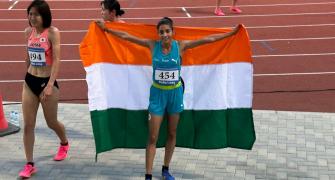The government has come out with the Vision 2010 document for the textiles sector, which aims to double India's share in global textile trade from 4 per cent to 8 per cent in the next six years.
The document also envisages trebling the value of India's textile exports to $50 billion during the period. India exports textiles worth $15 billion at present.
Formulated after intensive interaction with the industry and export promotion councils, the document said investments of over Rs 140,000 crore (Rs 1,400 billion) were expected in the sector after textile quotas were lifted on January 1, 2005.
The document envisages the Indian textile economy to grow from the current $37 billion to $85 billion by 2010 and creation of 12 million new jobs in the sector, an official release said.
The document was part of the presentation made by the textiles ministry to Prime Minister Manmohan Singh last evening.
The presentation highlighted the fact that new investments of Rs 50,000 crore (Rs 500 billion) had taken place in the last five years in the industry. Nine textile majors had invested Rs 2,600 crore (Rs 26 billion), with plans to invest another Rs 6,400 crore (Rs 64 billion), the document said.
In anticipation of the phase-out of the quota regime under the Multi-Fibre Agreement, the industry was upbeat and capacities were fully booked up to April 2005, it was revealed at the presentation.
India's cotton production also increased by 57 per cent over the last five years; and 3 million additional spindles and 30,000 shuttle-less looms were installed, it added.
The presentation pointed out that while there would be opportunities and challenges for the Indian textile industry in the post-MFA era, India had several natural advantages including a strong raw material base of cotton, man-made fibres, jute, silk and a large production capacity (spinning -- 21 per cent of world capacity and weaving -- 33 per cent of world capacity but of low technology).
There were, however, constraints relating to a fragmented industry, poor quality of cotton, high power costs, labour constraints and other infrastructural bottlenecks, it added.







